Founded in 1938 and published semiannually by Sophia University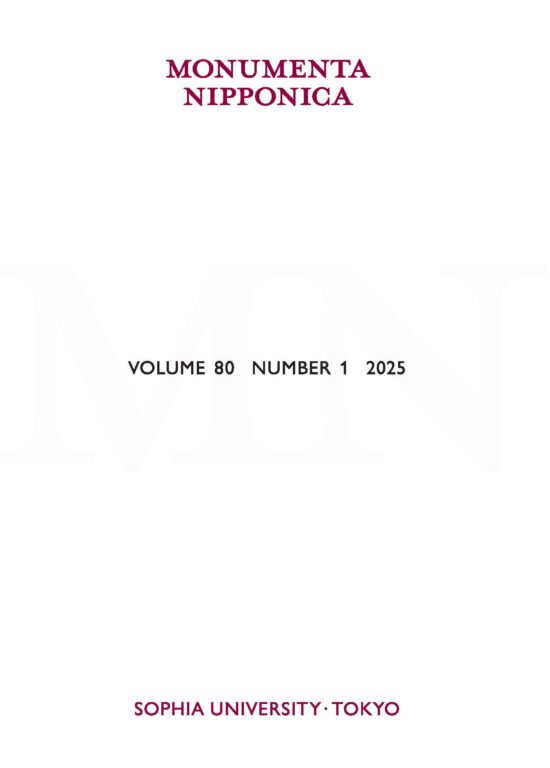 MN 80:1 (2025) New 2–47Revisiting the Origins of Hyakunin Isshu: Teika’s Gift to the UtsunomiyaKumiko Tabuchi, Translated by Jeffrey Knott
MN 80:1 (2025) New 2–47Revisiting the Origins of Hyakunin Isshu: Teika’s Gift to the UtsunomiyaKumiko Tabuchi, Translated by Jeffrey Knott MN 80:1 (2025) New 49–101Dreaming One’s Way to Good Health: A Translation of Jippensha Ikku’s Hara no Uchi Yōjō ShuronAngelika Koch
MN 80:1 (2025) New 49–101Dreaming One’s Way to Good Health: A Translation of Jippensha Ikku’s Hara no Uchi Yōjō ShuronAngelika Koch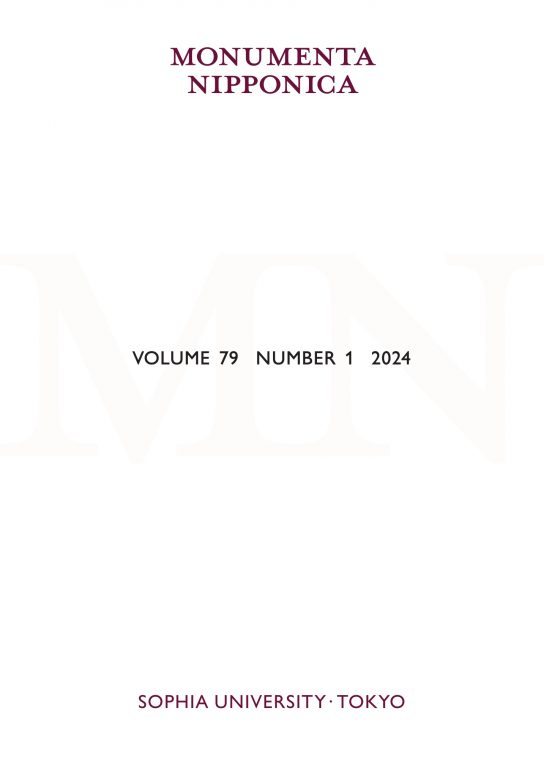 MN 79:1 (2024) 1–31Revisiting The Soil: Nagatsuka Takashi, Rural Japan, and the Limits of the Meiji NovelTyler Walker
MN 79:1 (2024) 1–31Revisiting The Soil: Nagatsuka Takashi, Rural Japan, and the Limits of the Meiji NovelTyler Walker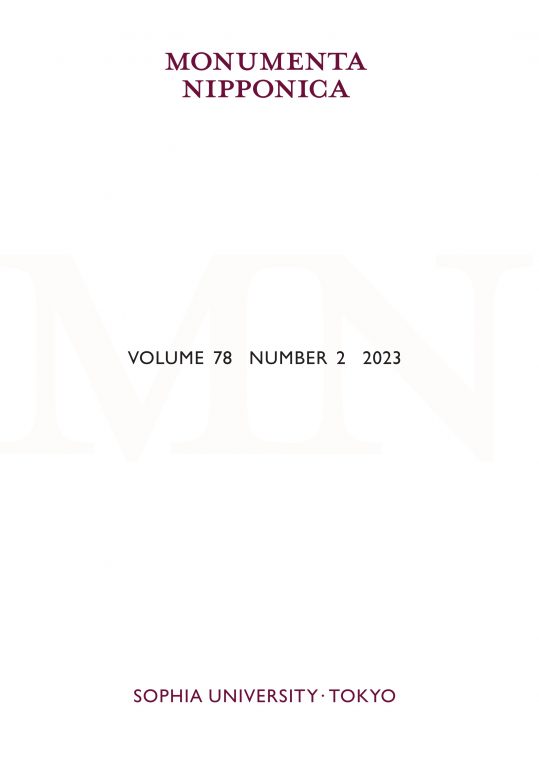 MN 78:2 (2023) 189–221Traces of Truth: Chūgan Engetsu’s KonhōronBrendan Arkell Morley
MN 78:2 (2023) 189–221Traces of Truth: Chūgan Engetsu’s KonhōronBrendan Arkell Morley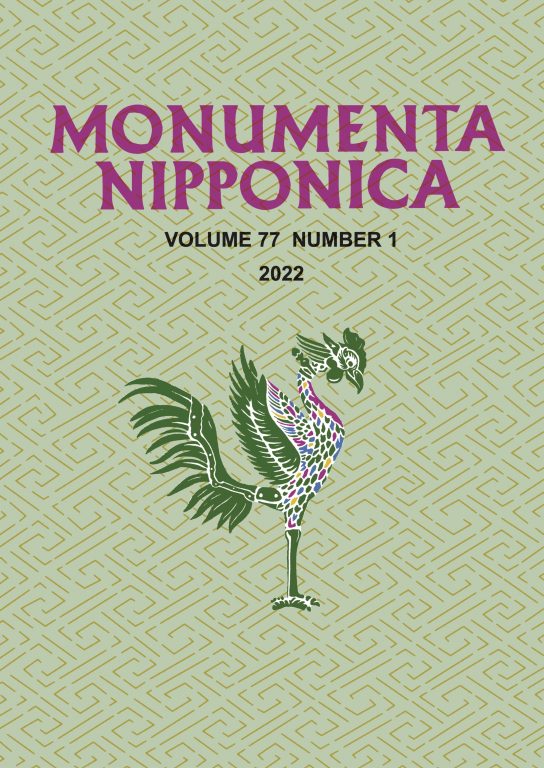 MN 77:1 (2022) 1–26Versifying for Others: Akazome Emon’s Proxy PoemsTakeshi Watanabe
MN 77:1 (2022) 1–26Versifying for Others: Akazome Emon’s Proxy PoemsTakeshi Watanabe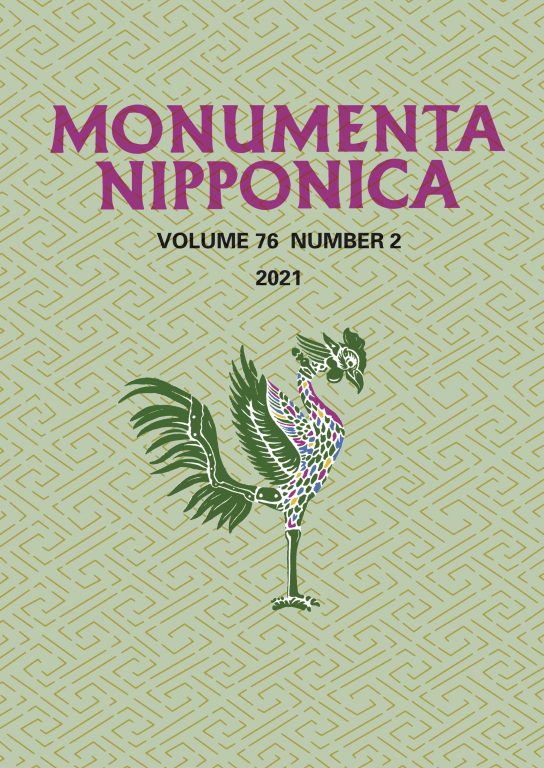 MN 76:2 (2021) 249–90Nihongi Banquet Poetry: Rewriting Japanese Myth in VerseMatthieu Felt
MN 76:2 (2021) 249–90Nihongi Banquet Poetry: Rewriting Japanese Myth in VerseMatthieu Felt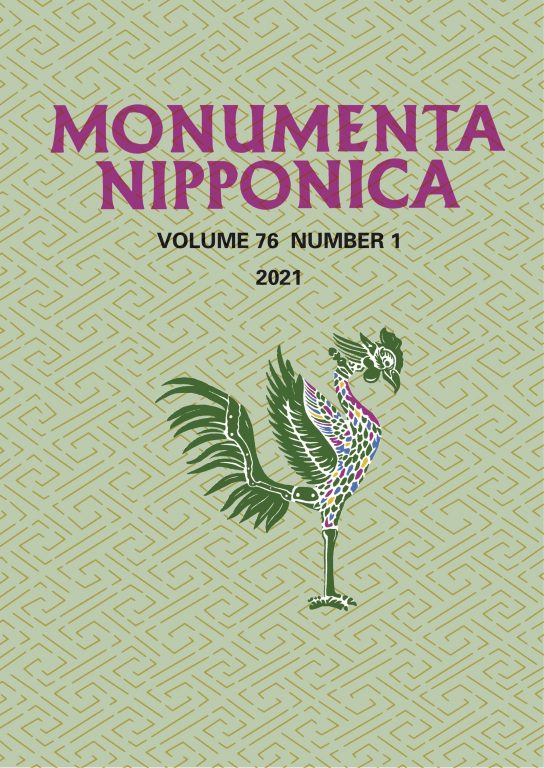 MN 76:1 (2021) 69–115Nihon Gaishi Goes Global: A Translation History of a Nineteenth-Century BlockbusterRobert Tuck
MN 76:1 (2021) 69–115Nihon Gaishi Goes Global: A Translation History of a Nineteenth-Century BlockbusterRobert Tuck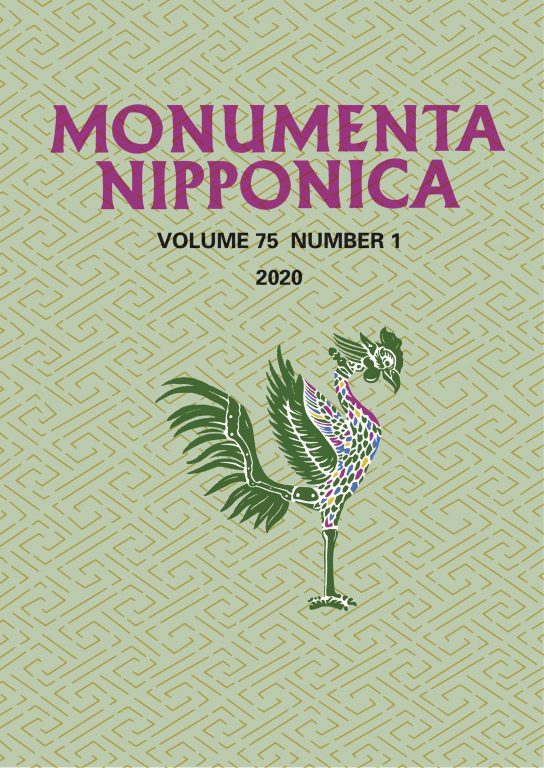 MN 75:1 (2020) 1–44A Format of Their Own: The Hundred-Poem Sequences of Sone no Yoshitada, Minamoto no Shitagō, and the Priest EgyōRoselee Bundy
MN 75:1 (2020) 1–44A Format of Their Own: The Hundred-Poem Sequences of Sone no Yoshitada, Minamoto no Shitagō, and the Priest EgyōRoselee Bundy MN 75:1 (2020) 45–89The Author as Protagonist: Professionalizing the Craft of the Kusazōshi WriterDavid C. Atherton
MN 75:1 (2020) 45–89The Author as Protagonist: Professionalizing the Craft of the Kusazōshi WriterDavid C. Atherton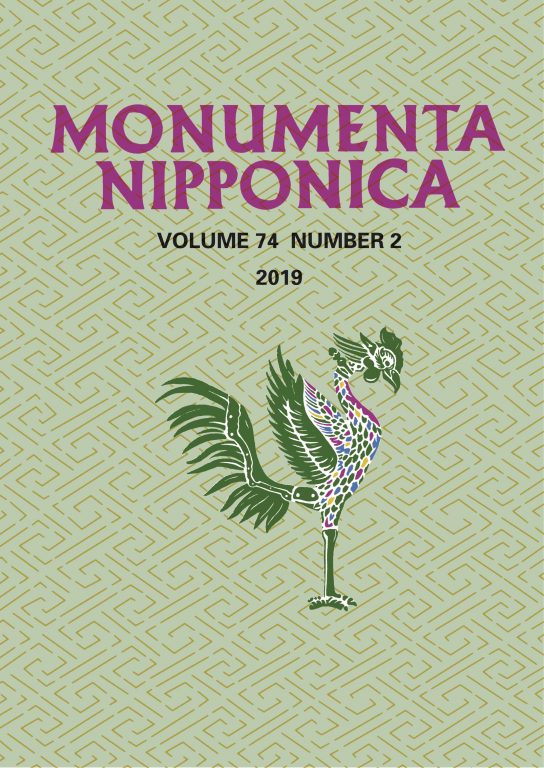 MN 74:2 (2019) 201–209Reflections on the Man’yōshū EraFujiwara no Shunzei, Translated by Malgorzata Karolina Citko and Kei Umeda
MN 74:2 (2019) 201–209Reflections on the Man’yōshū EraFujiwara no Shunzei, Translated by Malgorzata Karolina Citko and Kei Umeda MN 74:2 (2019) 173–209How to Establish a Poetic School in Early Medieval Japan: Fujiwara no Shunzei’s Man’yōshū JidaikōMalgorzata Karolina Citko
MN 74:2 (2019) 173–209How to Establish a Poetic School in Early Medieval Japan: Fujiwara no Shunzei’s Man’yōshū JidaikōMalgorzata Karolina Citko MN 74:2 (2019) 211–48Casting Spells: Combat Charms and Secret Scrolls in the Warrior Fiction of Late Medieval JapanR. Keller Kimbrough
MN 74:2 (2019) 211–48Casting Spells: Combat Charms and Secret Scrolls in the Warrior Fiction of Late Medieval JapanR. Keller Kimbrough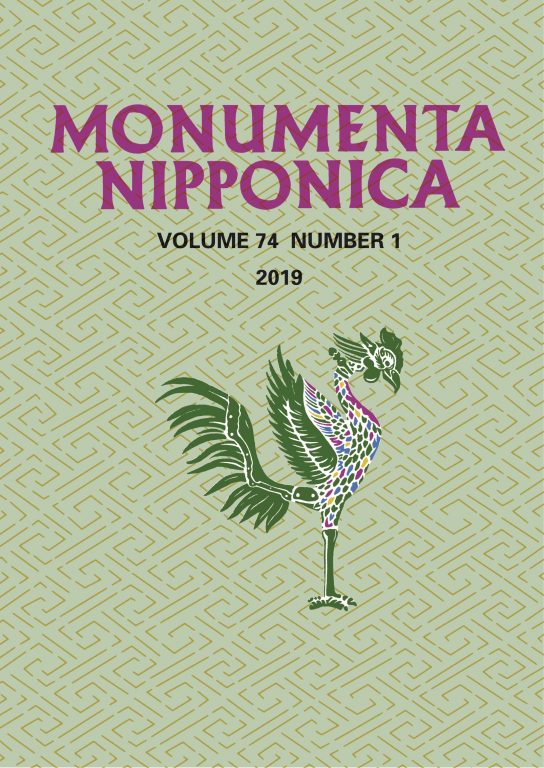 MN 74:1 (2019) 1–32Unearthing Lost Memories: A Reexamination of the Role of Naniwa in Early JapanJoshua Frydman
MN 74:1 (2019) 1–32Unearthing Lost Memories: A Reexamination of the Role of Naniwa in Early JapanJoshua Frydman MN 74:1 (2019) 33–57War without Blood? The Literary Uses of a Taboo Fluid in Heike MonogatariVyjayanthi R. Selinger
MN 74:1 (2019) 33–57War without Blood? The Literary Uses of a Taboo Fluid in Heike MonogatariVyjayanthi R. Selinger MN 74:1 (2019) 59–84The Poetics of Nativism: Motoori Norinaga and the Sacralization of Japanese LiteratureEmi Foulk Bushelle
MN 74:1 (2019) 59–84The Poetics of Nativism: Motoori Norinaga and the Sacralization of Japanese LiteratureEmi Foulk Bushelle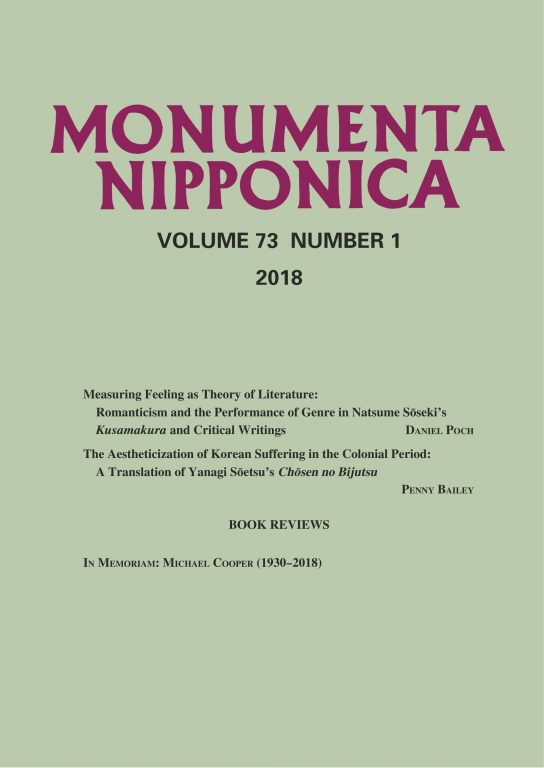 MN 73:1 (2018) 1–26Measuring Feeling as Theory of Literature: Romanticism and the Performance of Genre in Natsume Sōseki’s Kusamakura and Critical WritingsDaniel Poch
MN 73:1 (2018) 1–26Measuring Feeling as Theory of Literature: Romanticism and the Performance of Genre in Natsume Sōseki’s Kusamakura and Critical WritingsDaniel Poch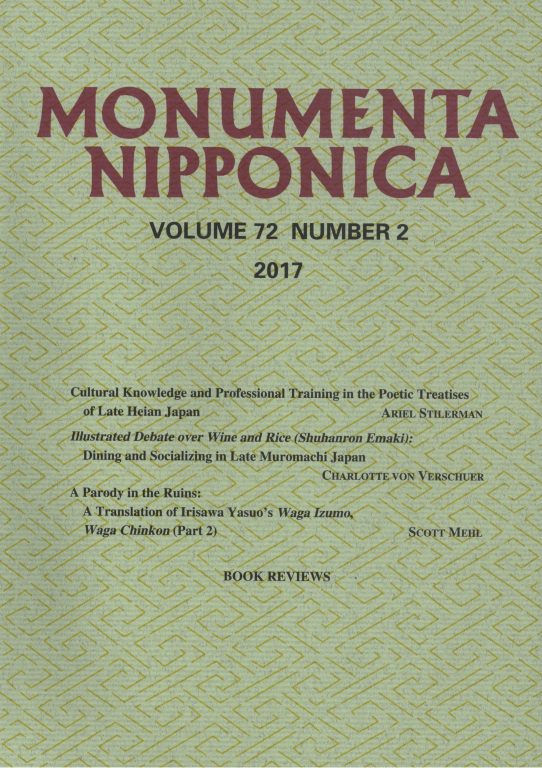 MN 72:2 (2017) 153–87Cultural Knowledge and Professional Training in the Poetic Treatises of Late Heian JapanAriel Stilerman
MN 72:2 (2017) 153–87Cultural Knowledge and Professional Training in the Poetic Treatises of Late Heian JapanAriel Stilerman MN 72:2 (2017) 223–64A Parody in the Ruins: A Translation of Irisawa Yasuo’s Waga Izumo, Waga Chinkon (Part 2)Scott Mehl, Translated by Scott Mehl, Original by Irisawa Yasuo
MN 72:2 (2017) 223–64A Parody in the Ruins: A Translation of Irisawa Yasuo’s Waga Izumo, Waga Chinkon (Part 2)Scott Mehl, Translated by Scott Mehl, Original by Irisawa Yasuo MN 72:2 (2017) 225–64My Izumo, My Requiem (Part 2)Irisawa Yasuo, Translated by Scott Mehl
MN 72:2 (2017) 225–64My Izumo, My Requiem (Part 2)Irisawa Yasuo, Translated by Scott Mehl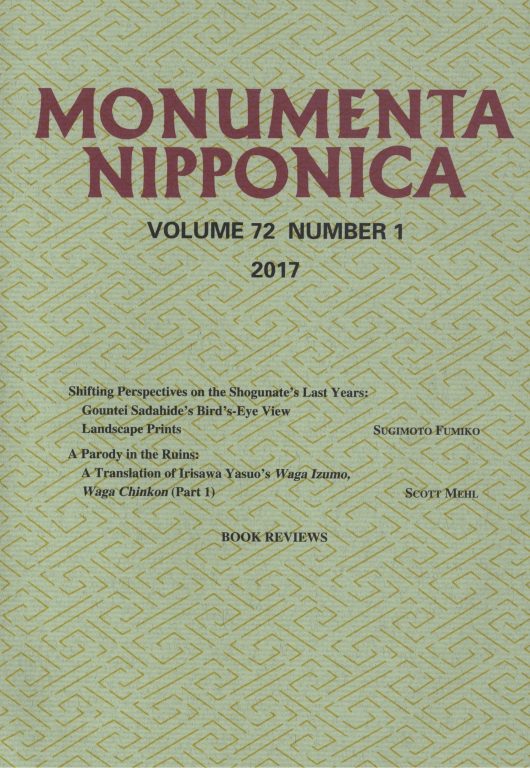 MN 72:1 (2017) 31–70A Parody in the Ruins: A Translation of Irisawa Yasuo’s Waga Izumo, Waga Chinkon (Part 1)Scott Mehl
MN 72:1 (2017) 31–70A Parody in the Ruins: A Translation of Irisawa Yasuo’s Waga Izumo, Waga Chinkon (Part 1)Scott Mehl MN 72:1 (2017) 51–70My Izumo, My Requiem (Part 1)Irisawa Yasuo, Translated by Scott Mehl
MN 72:1 (2017) 51–70My Izumo, My Requiem (Part 1)Irisawa Yasuo, Translated by Scott Mehl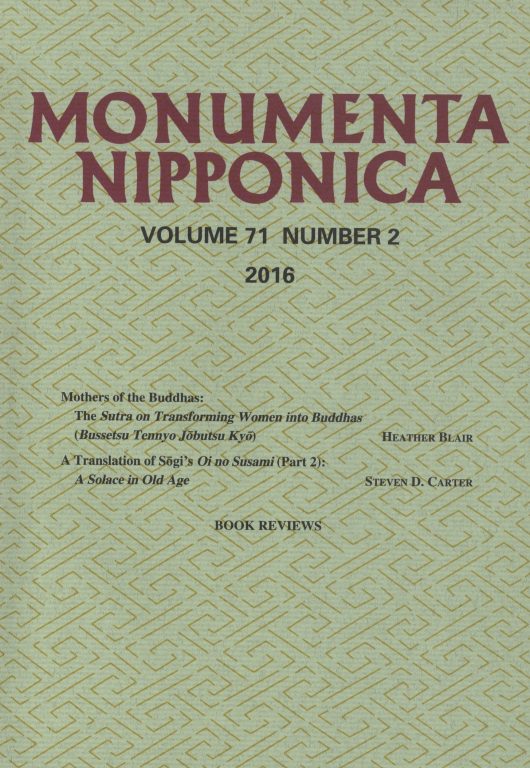 MN 71:2 (2016) 295–369A Translation of Sōgi’s Oi no Susami (Part 2): A Solace in Old AgeSteven D. Carter
MN 71:2 (2016) 295–369A Translation of Sōgi’s Oi no Susami (Part 2): A Solace in Old AgeSteven D. Carter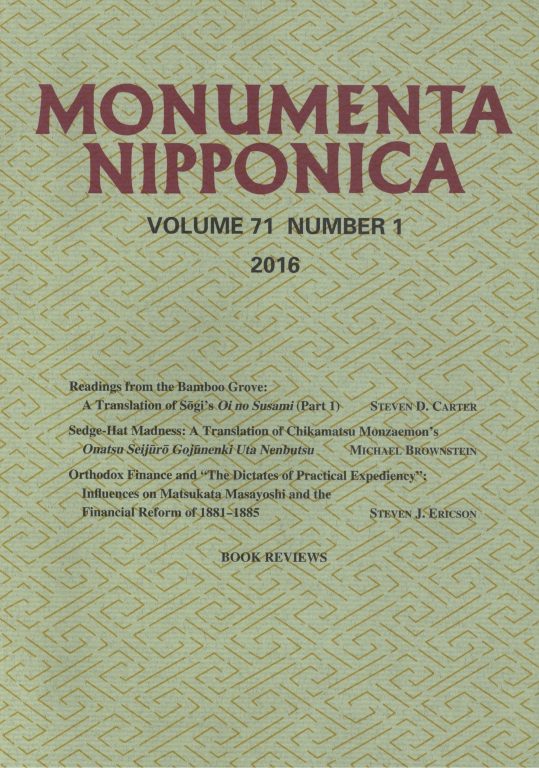 MN 71:1 (2016) 29–42A Solace in Old Age (Part 1)Sōgi, Translated by Steven D. Carter
MN 71:1 (2016) 29–42A Solace in Old Age (Part 1)Sōgi, Translated by Steven D. Carter MN 71:1 (2016) 1–42Readings from the Bamboo Grove: A Translation of Sōgi’s Oi no Susami (Part 1)Steven D. Carter
MN 71:1 (2016) 1–42Readings from the Bamboo Grove: A Translation of Sōgi’s Oi no Susami (Part 1)Steven D. Carter MN 71:1 (2016) 55–82Onatsu and Seijūrō: Prayers on the Fiftieth AnniversaryChikamatsu Monzaemon, Translated by Michael C. Brownstein
MN 71:1 (2016) 55–82Onatsu and Seijūrō: Prayers on the Fiftieth AnniversaryChikamatsu Monzaemon, Translated by Michael C. Brownstein MN 71:1 (2016) 43–82Sedge-Hat Madness: A Translation of Chikamatsu Monzaemon’s Onatsu Seijūrō Gojūnenki Uta NenbutsuMichael C. Brownstein
MN 71:1 (2016) 43–82Sedge-Hat Madness: A Translation of Chikamatsu Monzaemon’s Onatsu Seijūrō Gojūnenki Uta NenbutsuMichael C. Brownstein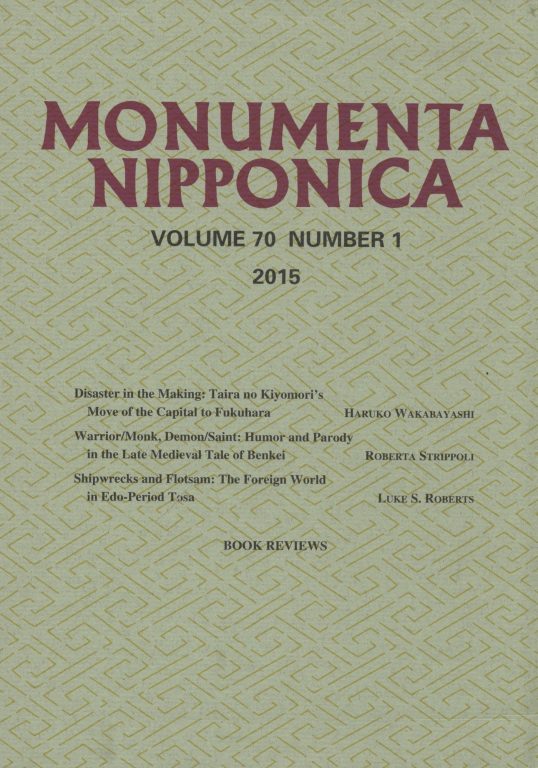 MN 70:1 (2015) 39–81Warrior/Monk, Demon/Saint: Humor and Parody in the Late Medieval Tale of BenkeiRoberta Strippoli
MN 70:1 (2015) 39–81Warrior/Monk, Demon/Saint: Humor and Parody in the Late Medieval Tale of BenkeiRoberta Strippoli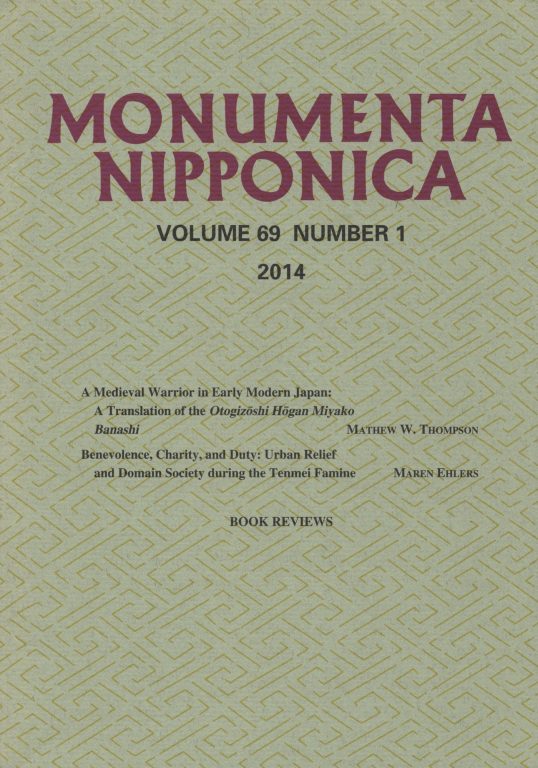 MN 69:1 (2014) 15–54Hōgan Miyako Banashi: The Tale of Yoshitsune in the CapitalMathew W. Thompson, Translated by Mathew W. Thompson
MN 69:1 (2014) 15–54Hōgan Miyako Banashi: The Tale of Yoshitsune in the CapitalMathew W. Thompson, Translated by Mathew W. Thompson MN 69:1 (2014) 1–54A Medieval Warrior in Early Modern Japan: A Translation of the Otogizōshi Hōgan Miyako BanashiMathew W. Thompson
MN 69:1 (2014) 1–54A Medieval Warrior in Early Modern Japan: A Translation of the Otogizōshi Hōgan Miyako BanashiMathew W. Thompson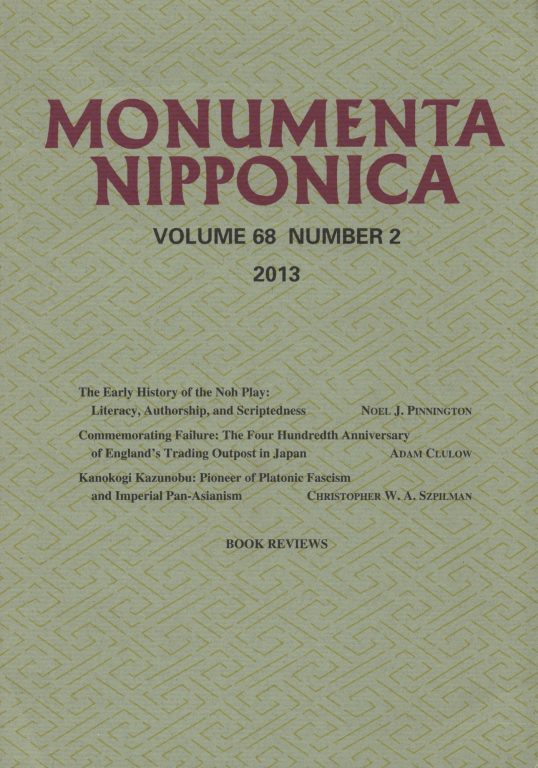 MN 68:2 (2013) 163–206The Early History of the Noh Play: Literacy, Authorship, and ScriptednessNoel John Pinnington
MN 68:2 (2013) 163–206The Early History of the Noh Play: Literacy, Authorship, and ScriptednessNoel John Pinnington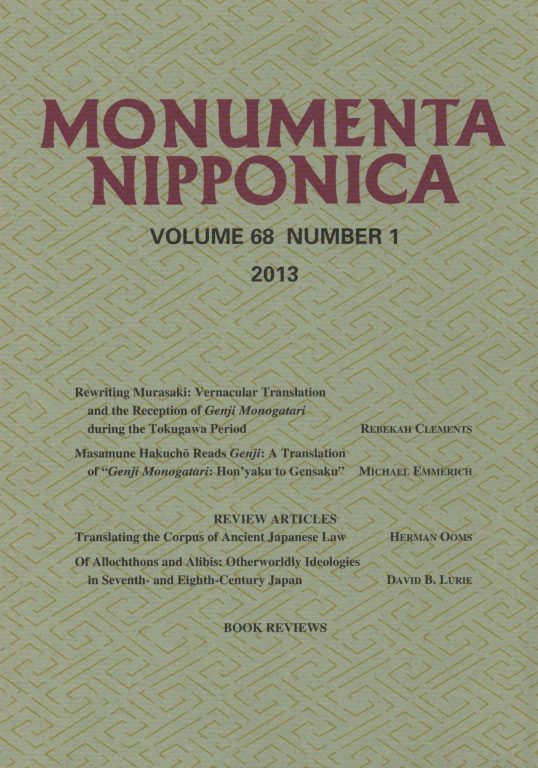 MN 68:1 (2013) 1–36Rewriting Murasaki: Vernacular Translation and the Reception of Genji Monogatari during the Tokugawa PeriodRebekah Clements
MN 68:1 (2013) 1–36Rewriting Murasaki: Vernacular Translation and the Reception of Genji Monogatari during the Tokugawa PeriodRebekah Clements MN 68:1 (2013) 53–68Genji Monogatari: Hon’yaku to GensakuMasamune Hakuchō , Translated by Michael Emmerich
MN 68:1 (2013) 53–68Genji Monogatari: Hon’yaku to GensakuMasamune Hakuchō , Translated by Michael Emmerich MN 68:1 (2013) 37–68Masamune Hakuchō Reads Genji: A Translation of “Genji Monogatari: Hon’yaku to Gensaku”Michael Emmerich
MN 68:1 (2013) 37–68Masamune Hakuchō Reads Genji: A Translation of “Genji Monogatari: Hon’yaku to Gensaku”Michael Emmerich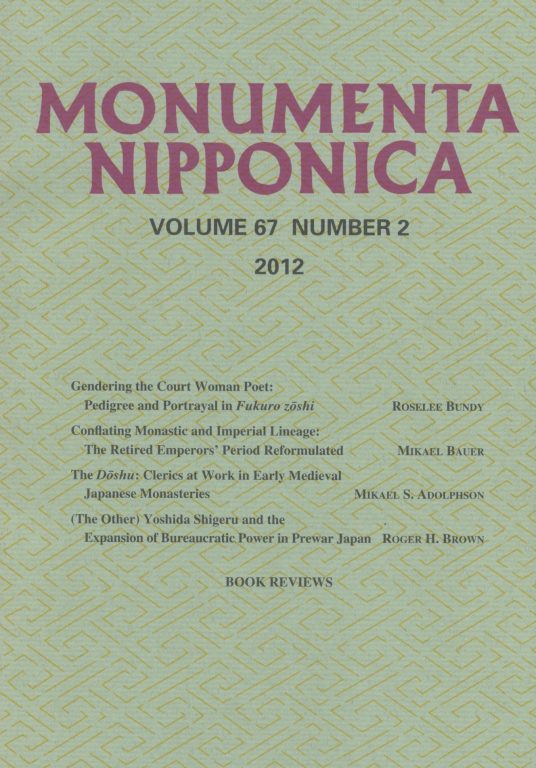 MN 67:2 (2012) 201–38Gendering the Court Woman Poet: Pedigree and Portrayal in Fukuro zōshiRoselee Bundy
MN 67:2 (2012) 201–38Gendering the Court Woman Poet: Pedigree and Portrayal in Fukuro zōshiRoselee Bundy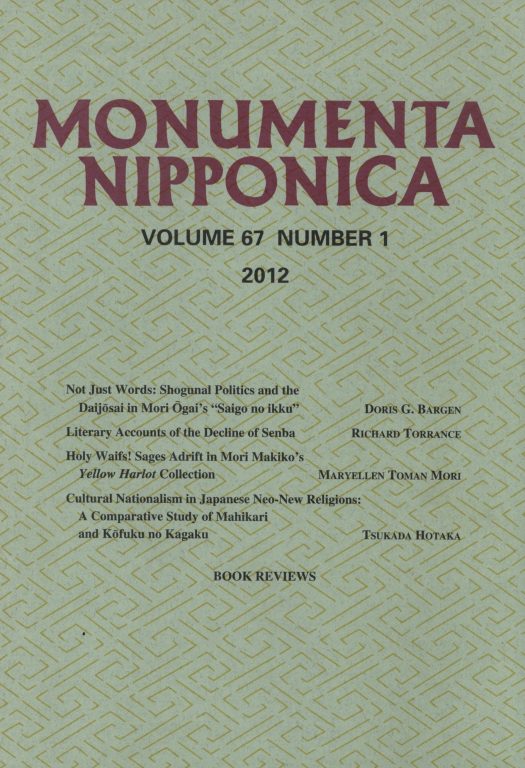 MN 67:1 (2012) 1–27Not Just Words: Shogunal Politics and the Daijōsai in Mori Ōgai’s “Saigo no ikku”Doris G. Bargen
MN 67:1 (2012) 1–27Not Just Words: Shogunal Politics and the Daijōsai in Mori Ōgai’s “Saigo no ikku”Doris G. Bargen MN 67:1 (2012) 29–73Literary Accounts of the Decline of SenbaRichard Torrance
MN 67:1 (2012) 29–73Literary Accounts of the Decline of SenbaRichard Torrance MN 67:1 (2012) 75–131Holy Waifs! Sages Adrift in Mori Makiko’s Yellow Harlot CollectionMaryellen Toman Mori
MN 67:1 (2012) 75–131Holy Waifs! Sages Adrift in Mori Makiko’s Yellow Harlot CollectionMaryellen Toman Mori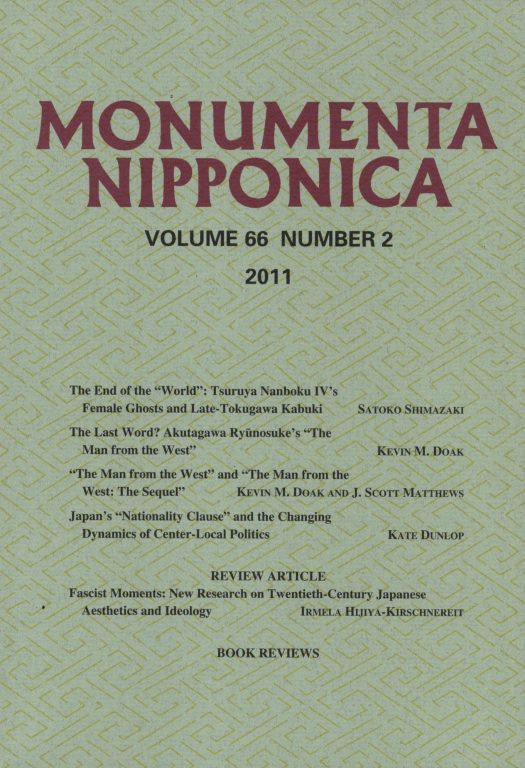 MN 66:2 (2011) 209–46The End of the “World”: Tsuruya Nanboku IV’s Female Ghosts and Late-Tokugawa KabukiSatoko Shimazaki
MN 66:2 (2011) 209–46The End of the “World”: Tsuruya Nanboku IV’s Female Ghosts and Late-Tokugawa KabukiSatoko Shimazaki MN 66:2 (2011) 257–80“The Man from the West” and “The Man from the West: The Sequel”Akutagawa Ryūnosuke, Translated by Kevin M. Doak and J. Scott Matthews
MN 66:2 (2011) 257–80“The Man from the West” and “The Man from the West: The Sequel”Akutagawa Ryūnosuke, Translated by Kevin M. Doak and J. Scott Matthews MN 66:2 (2011) 247–80The Last Word?: Akutagawa Ryūnosuke’s “The Man from the West”Kevin M. Doak
MN 66:2 (2011) 247–80The Last Word?: Akutagawa Ryūnosuke’s “The Man from the West”Kevin M. Doak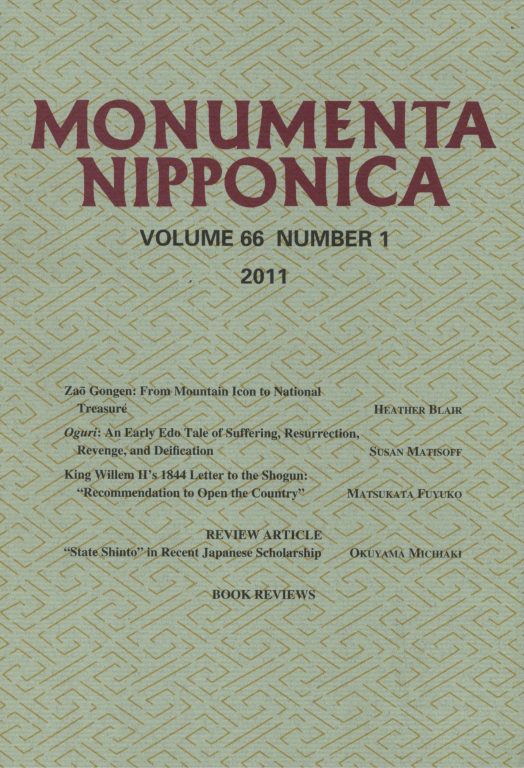 MN 66:1 (2011) 59–97OguriTranslated by Susan Matisoff
MN 66:1 (2011) 59–97OguriTranslated by Susan Matisoff MN 66:1 (2011) 49–97Oguri: An Early Edo Tale of Suffering, Resurrection, Revenge, and DeificationSusan Matisoff
MN 66:1 (2011) 49–97Oguri: An Early Edo Tale of Suffering, Resurrection, Revenge, and DeificationSusan Matisoff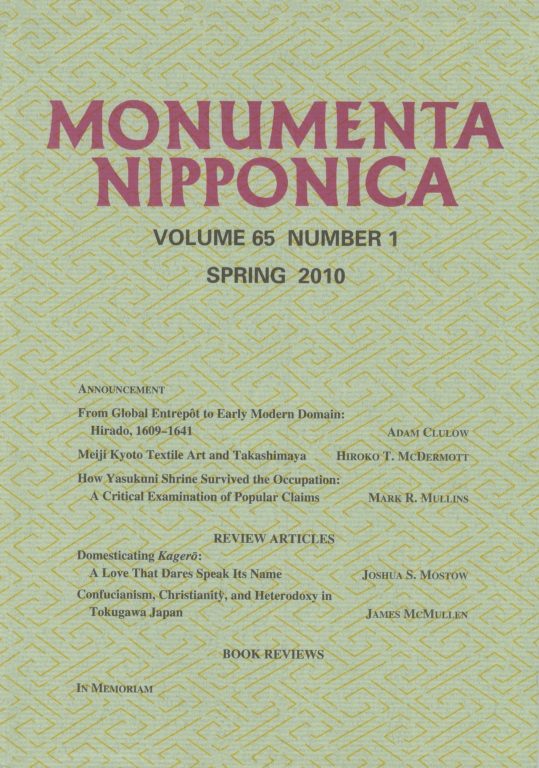 MN 65:1 (2010) 137–47Domesticating Kagerō: A Love That Dares Speak Its NameJoshua S. Mostow
MN 65:1 (2010) 137–47Domesticating Kagerō: A Love That Dares Speak Its NameJoshua S. Mostow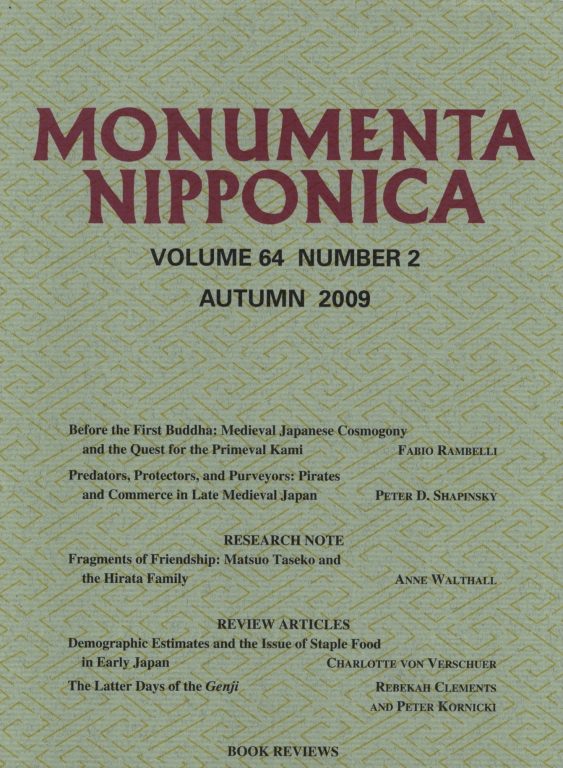 MN 64:2 (2009) 363–72The Latter Days of the GenjiRebekah Clements and Peter F. Kornicki
MN 64:2 (2009) 363–72The Latter Days of the GenjiRebekah Clements and Peter F. Kornicki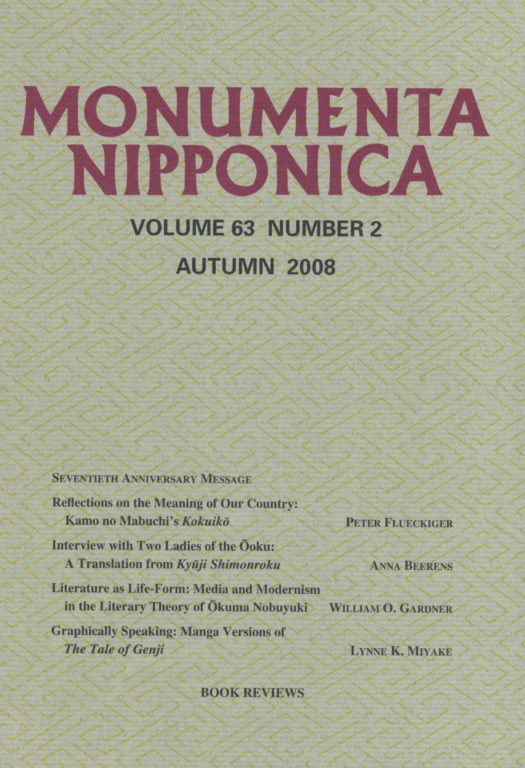 MN 63:2 (2008) 325–57Literature as Life-Form: Media and Modernism in the Literary Theory of Ōkuma NobuyukiWilliam O. Gardner
MN 63:2 (2008) 325–57Literature as Life-Form: Media and Modernism in the Literary Theory of Ōkuma NobuyukiWilliam O. Gardner MN 63:2 (2008) 359–92Graphically Speaking: Manga Versions of The Tale of GenjiLynne K. Miyake
MN 63:2 (2008) 359–92Graphically Speaking: Manga Versions of The Tale of GenjiLynne K. Miyake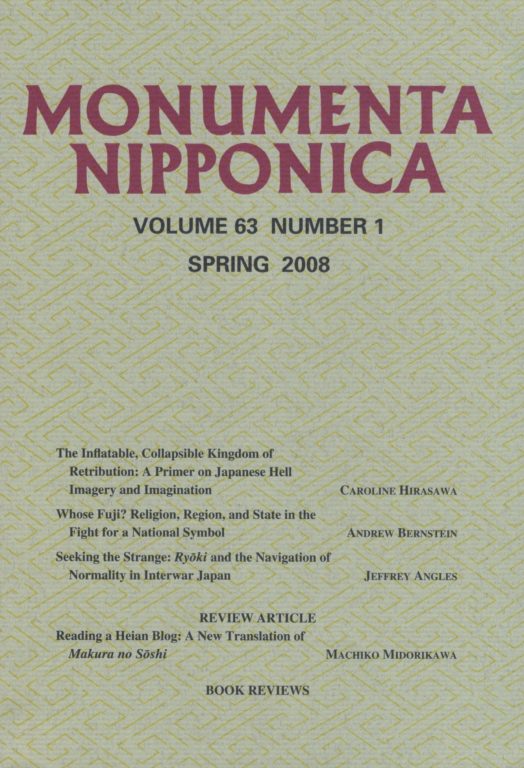 MN 63:1 (2008) 101–41Seeking the Strange: Ryōki and the Navigation of Normality in Interwar JapanJeffrey Angles
MN 63:1 (2008) 101–41Seeking the Strange: Ryōki and the Navigation of Normality in Interwar JapanJeffrey Angles MN 63:1 (2008) 143–60Reading a Heian Blog: A New Translation of Makura no SōshiMachiko Midorikawa
MN 63:1 (2008) 143–60Reading a Heian Blog: A New Translation of Makura no SōshiMachiko Midorikawa

























